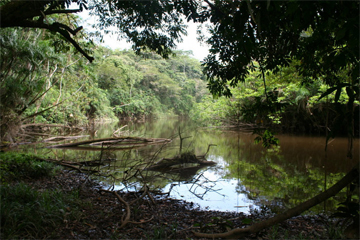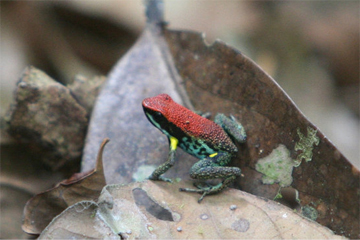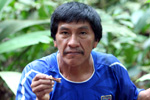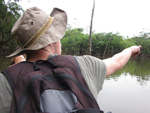Germany has backed out of a pledge to commit $50 million a year to Ecuador’s Yasuni ITT Initiative, reports Science Insider. The move by Germany potentially upsets an innovative program hailed by environmentalists and scientists alike. This one-of-a-kind initiative would protect a 200,000 hectare bloc in Yasuni National Park from oil drilling in return for a trust fund of $3.6 billion, or about half the market value of the nearly billion barrels of oil lying underneath the area. The plan is meant to mitigate climate change, protect biodiversity, and safeguard the rights of indigenous people.
Yasuni National Park, of which the ITT block makes up over a fifth, is considered a top contender for the most biodiverse place on Earth. For example, researchers have found more tree species (655 to be exact) in a single hectare in Yasuni than in all of the US and Canada combined. Yasuni also contains the highest biodiversity of reptiles and amphibians in the world with 271 species. But bugs may win the day yet: according to entomologist, Dr. Terry Erwin, a single hectare of rainforest in Yasuni may contain as many as 100,000 unique insect species. This estimate, if proven true, is the highest per unit area in the world for any taxa, plant or animal.
 An oxbow lake in Yasuni National Park, home to anacondas, piranhas, electric eels, and freshwater stingrays. Photo by Jeremy Hance. |
Toward the goal of climate change mitigation, the Yasuni ITT Initiative would prevent around 407 million tons of carbon dioxide from being emitted into the atmosphere, simply by keeping the estimated 846 million barrels of petroleum from being extracted. The ITT bloc is also home to several indigenous communities, many of whom have chosen voluntary isolation.
Funds donated to the program would be held in a trust fund by the UN Development Program to be used strictly for environmental and poverty reduction programs in Ecuador.
No reason has been given for Germany’s withdrawal from the fund, however in the past the country was seen as one of the most promising donors. Despite its perceived merits, the initiative has not had much success in raising funds. The Ecuadorian government has insisted it must secure $100 million for Yasuni by the end of the year or it will open up the door to oil companies.
 Poison dart frog (Ameerega bilinguis) in Yasuni National Park. Photo by Jeremy Hance. |
“Unfortunately we are not getting the response we expected,” Ecuadorian President Rafael Correa said recently in a radio program. So far around $40 million has been pledged.
Researchers in the region say that if the initiative fails and the ITT-bloc is exploited, the Ecuadorian government must at least commit to banning roads in the region. Road construction brings with it a host of environmental issues, including deforestation, fragmentation, illegal logging and mining, poaching, and fires.
Related articles
Oil, indigenous people, and Ecuador’s big idea

(11/23/2010) Ecuador’s big idea—potentially Earth-rattling—goes something like this: the international community pays the small South American nation not to drill for nearly a billion barrels of oil in a massive block of Yasuni National Park. While Ecuador receives hundred of millions in an UN-backed fund, what does the international community receive? Arguably the world’s most biodiverse rainforest is saved from oil extraction, two indigenous tribes’ requests to be left uncontacted are respected, and some 400 million metric tons of CO2 is not emitted from burning the oil. In other words, the international community is being asked to put money where its mouth is on climate change, indigenous rights, and biodiversity loss. David Romo Vallejo, professor at the University of San Francisco Quito and co-director of Tiputini research station in Yasuni, recently told mongabay.com in an interview that this is “the best proposal so far made to ensure the protection of this incredible site.”

(10/28/2010) Although most Americans have likely seen photos and videos of the world’s largest rainforest, the Amazon, they will probably never see it face-to-face. For many, the Amazon seems incredibly remote: it is a dim, mysterious place, a jungle surfeit in adventure and beauty—but not a place to take a family vacation or spend a honeymoon. This means that the destruction of the Amazon, like the rainforest itself, also appears distant when seen from Oregon or North Carolina or Pennsylvania. Oil spills in Ecuador, cattle ranching in Brazil, hydroelectric dams in Peru: these issues are low, if not non-existent, for most Americans. But a visit to the Amazon changes all that. This was recently confirmed to me when I traveled with American college students during a trip to far-flung Yasuni National Park in Ecuador. As a part of a study abroad program with the University of San Francisco in Quito and the Galapagos Academic Institute for the Arts and Sciences (GAIAS), these students spend a semester studying ecology and environmental issues in Ecuador, including a first-time visit to the Amazon rainforest at Tiputini Biodiversity Station in Yasuni—and our trips just happened to overlap.
A look at Ecuador’s agreement to leave 846 million barrels of oil in the ground
(09/13/2010) Ecuador’s pioneering initiative to voluntarily leave nearly a billion barrels of oil under Yasuní National Park, an Amazonian reserve that is arguably the most biodiverse spot on Earth, took a major step forward in early August when the government signed an accord with the United Nations Development Programme (UNDP) for the long-awaited establishment of a trust fund. The signing event generated a wave of international media attention, but there has been very little scrutiny of what was actually signed. Here we present an initial analysis of the signed agreement, along with a brief discussion of some of the potential caveats. Due to the precedent-setting nature of this agreement, attention to the details is now of the utmost importance.